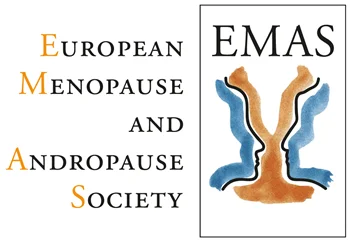Prof Petra Stute: Welcome to the EMAS Menopause in the Workplace Podcast, a special series celebrating World Menopause and Work Day, held every year on September 7. This Global Awareness Day was launched by the European Menopause and Andropause Society (EMAS) in 2021, following the publication of our Global Consensus Recommendations on Menopause in the Workplace, to spark conversation and action around an issue that affects millions, yet is still too often overlooked.
I’m Professor Petra Stute, president of EMAS, and here’s what we know: menopause impacts work and work impacts menopause, but too often, no one’s talking about it.
In this episode, Why general practitioners need better menopause training, we hear from two past presidents of EMAS, Professor Angelica Lindén Hirschberg from Sweden and Professor Tommaso Simoncini from Italy. Together, they examine why menopause remains overlooked in medical education, especially for general practitioners, and what needs to change. Because supporting women at midlife starts with making sure the people who care for them are prepared.
Prof Angelica L. Hirschberg: I’m a gynaecologist and professor at Karolinska Institutet and Karolinska University Hospital. And I teach medical students, residents in OBGYN and at all levels and in menopause management. And I think this is very, very important for all health professionals. And in fact, I think menopause management has been silent for almost two decades due to confusion and misinterpretations of benefits and risks with menopausal hormone therapy. And that led to a whole generation of doctors who didn’t learn about menopause. And of course, this also has had consequences for women not given proper treatment. Fortunately, during the late, let us say, seven years or something like that, we can see a really growing interest in menopause. And I think that that is really great. And now it’s important that professionals show women that we have the knowledge and we will give you and offer you high-quality information and treatment.
Professor Tommaso Simoncini: I’m professor of obstetrics and gynecology at the University of Pisa, Italy. I think it’s time, really, for a big menopause review. So there’s a growing interest. The growing interest is because both women are as patients when they go through menopause, are now appreciating again that not everything that happens naturally can be fine for the life, for the health, for the quality of life, for their activities. And there’s a renewed perception that there’s a number of possibilities. That not just us as physicians, but for sure we as physicians have to treat these complaints, but the society at large. So there’s a number of initiatives that can be supported in order to try and easy the life of, women undergoing menopause, trying to make their life, their working life, their societal life, more adapted to the changing experience in their life at this very sensitive time of their life. So I think it’s a very interesting time because there’s a generalized perception that this is important. And this opens the way for scientific societies like EMAS to spread the word, to propose what we know from many, many years and to rediscuss the topic of menopause again with the new perspective.
Prof Angelica L. Hirschberg: I can only refer to how it is in Sweden, but I think the situation is quite similar in other European countries. Menopause education is extremely short for both medical students and residents, and it could involve only a single lecture or a single seminar. So I think this is really a shame, because this is about half of the population and women’s health. So I really believe that menopause management is a neglected area.
Professor Tommaso Simoncini: I think it’s really, it’s really peculiar that physicians are not exposed extensively to menopause education. This is funny because, when you know, we teach gynecology and obstetrics, and menopause is one lecture, similar to ovarian cancer or to myomas, or to bleeding disorders. But those conditions just interest some women. Only a small number of women. While menopause is something that is ubiquitous. So all women that reach the age of menopause will undergo menopause sooner or later. So it’s more than a condition. It’s something that should be taught more in general because all physicians need to understand what changes in a woman’s life, at midlife, in order to understand better all the conditions that will ensue because menopause, we know, alters significantly the aging process. It alters the development, the risk of developing chronic diseases like cardiovascular disease, brain disorders, and musculoskeletal disorders. It’s very important. It’s very gender specific. So it should certainly deserve more space in medical education. I think the first blind spot is providing simple and understandable information for women, delivering them the information, an appropriate and informed information on what is menopause, what it involves, what are the consequences, so that we can empower them to seek, assistance if they need it. So this is something that is, in theory, quite easy. It’s actually made much easier nowadays by the widespread use of web-based applications, website and chats. Menopause is a trending topic more than it was a few years ago. So I think this is a blind spot that is becoming, covered by spontaneous interest by women. The only thing is that we need to be sure that women receive appropriate information. So scientifically sound information. And so scientific societies like EMAS are to be commended if they undergo this information like what we are doing now with podcasts or other things that can reach out. So the other blind spot is, GPs. So the GPS are, in most countries, the first interface, sometimes the only interface between women and their health. So, GPs are extremely busy. Nowadays, they have to know a vast amount of information on all types of disorders. They have lots of bureaucracy, so it’s perfectly understandable that they might have trouble in undergoing new training or new updating into fields like menopause, which is not diabetes, it’s not brain disorders, it’s not cardiovascular disease, it’s not oncology. So it’s kind of less, pressing for them. But nonetheless, it’s very important. So we need to try to find a way to deliver them the right information in a very simple format so that it’s acceptable for them, so that it’s feasible for them to take those, you know, right informations and to make the right use for the clinical practice. That is I think the most difficult task for us. So to make small pills that are very targeted to GPs, so that they can have the time to take these pills.
Prof Angelica L. Hirschberg: In Sweden, we know that menopause management is very unequal. For instance, there is good access to private colleges in the big cities, but in smaller cities and in rural areas, there is hardly any private gynaecologists. And then we have to rely on GPs, and some GPs, they are really well educated in this field, but it could be less good in other areas. So I think it’s very important now to focus on the education for GPs. And when it comes to inequality, we also know that there is a clear association between the use of menopausal hormone therapy and education and income of the women, and also the country of birth. So I think we have to be aware that the access to care in this field is, is very unequal. And for fragile groups or women, they may not come to doctors to ask for information and treatment. So it’s really important to educate, about this in general terms, and not at least to focus on the education for GPS. For instance, in Sweden now, it has been paid attention to the need of better education for GPs, but the problem is that, like you Tommaso said, that the poor GPs, they have a big responsibility for many patient groups. But, actually, I believe that these patients are already in primary care, but maybe the GPs are not aware of it. Maybe they misinterpreted the symptoms that women have and believe that this is primarily anxiety or sleeping disorders. And instead of treating with menopausal hormone therapy, they give them sleeping pills and so on. So I think it’s very important that they have menopausal symptoms in their mind to really understand women. And, so they get proper treatment.
Professor Tommaso Simoncini: And if I may add another, another level of awareness, should be the one that we are trying to convince that it’s important to develop, the workplace. So most women work in environments where it is becoming important to promote health and the welfare of the people who work in that certain setting. Now, there is, there’s more attention to women’s specific needs, so there’s more attention to menstrual cycle disturbances, to pregnancy and fertility care. Menopause should be one of the parts that should be implemented most. So we know that it’s very important not just for women, but also for the sake of the good performance of the workers. So it’s a win-win situation where helping working environment can spread knowledge, can kind of make everybody in the workplace more sensitive to the issues that women undergoing menopause might encounter. And this, of course, is a chain of knowledge that grows and makes menopause more of a normal thing, but it also follows menopause, with things that can help, coping with that situation, and that help women accept this new phase of their life. So I think that there is also a site of our society, where new knowledge of menopause should be really implemented. And there’s a lot of space to do more than what is done right now.
Prof Angelica L. Hirschberg: So my final message would be that there is a great need for education in menopausal care, and particularly for GPS in primary care. And I think it’s important that healthcare professionals regain the competence and trust in the field in order to offer professional and personalised care for women with menopausal symptoms.
Professor Tommaso Simoncini: My final message would be that, either if one is a healthcare professional, like a GP or any other allied professional, or if anyone is a woman, in both cases, it’s very important not to minimise Menopause. Menopause is an important step in a woman’s life. It’s not necessarily a dreadful step, but it can be in some cases. So anyhow, it’s very important to be able to discuss menopause with women. Women are really willing to discuss about their lives and what menopause means to them. This is a very powerful step in their lives. So nobody should minimise the relevance of this relevant step in a woman’s life. So, correct knowledge is the basis for correct discussion. And, from then, from there, you know, it’s where the correct care starts. So if the people receive the right information, then they would be able to inquire for solutions for problems they might have, and not just be left with a generalised understatement that menopause is something natural, so you shouldn’t care if you’re not feeling well. That’s not correct. So it’s not a modern concept. And women are understanding that, and GPs should follow.
Prof Petra Stute: Thanks for listening. If you enjoyed this episode, don’t keep it to yourself. Share it with a colleague, a friend, or someone in your workplace who might need to hear it. To discover more about menopause at work and how to take action, visit emas-online.org and explore our resources, events, and educational tools. Let’s keep the conversation going.


